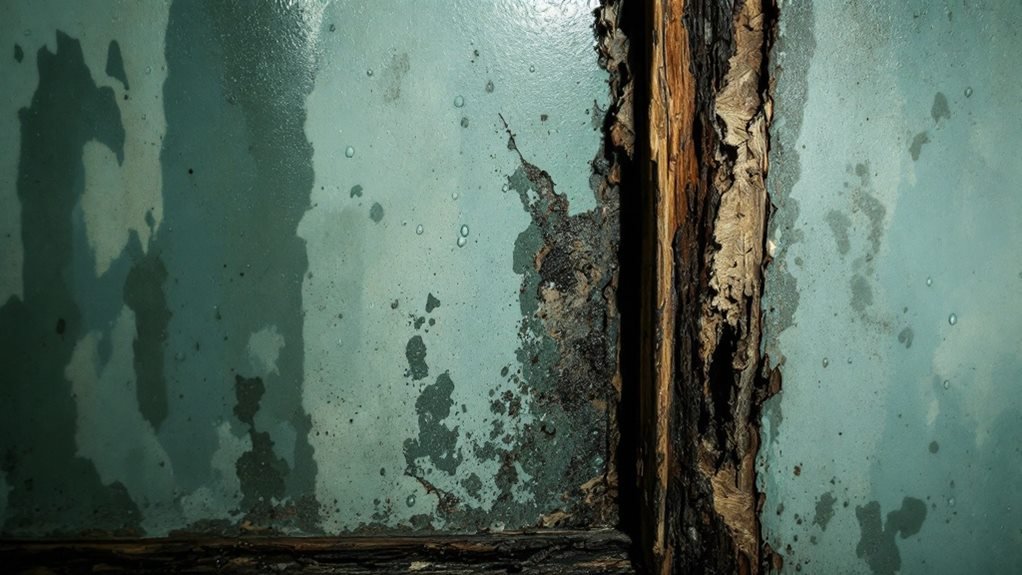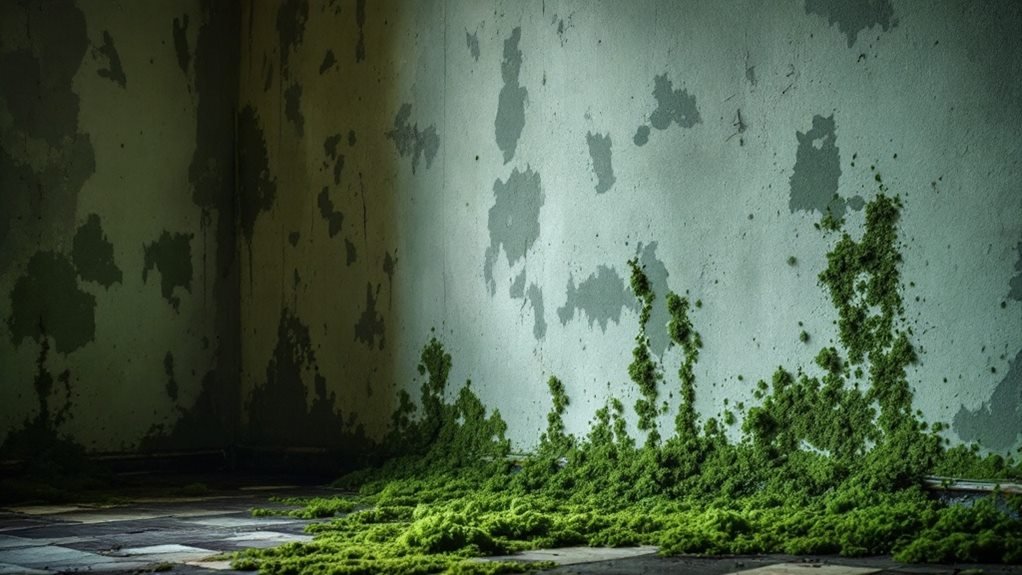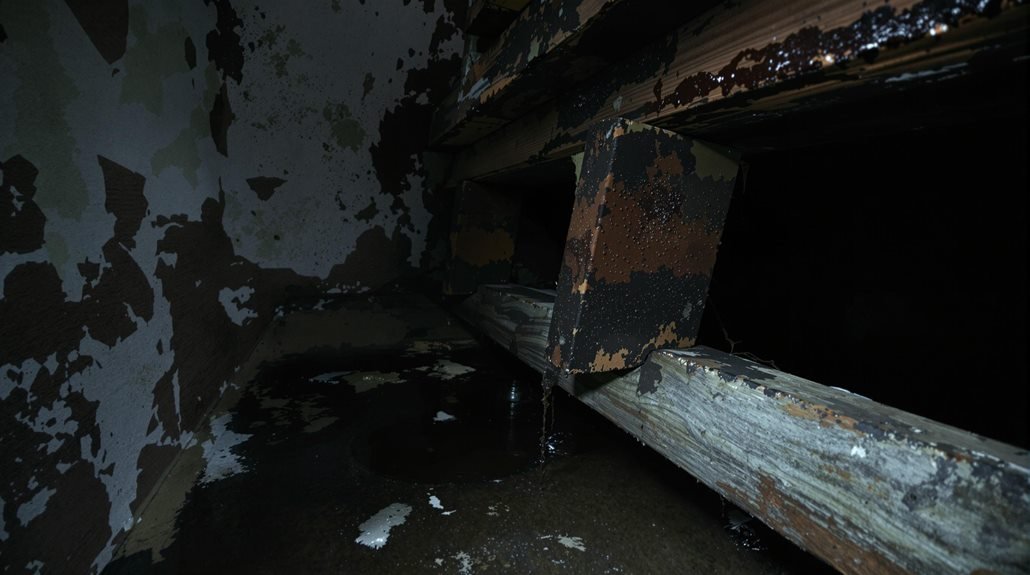When you notice water damage in your home, it's easy to dismiss it as a minor issue, but that can lead to serious health and structural risks. Prolonged exposure to moisture can promote mold growth, which brings a host of respiratory problems and allergic reactions. Meanwhile, the integrity of your home might be compromised, resulting in costly repairs down the line. Ignoring these signs can escalate into a much larger problem, leaving you wondering just how severe the consequences could be if action isn't taken soon. What should you be looking out for?
Understanding Water Damage

Water damage can creep into your life unnoticed, wreaking havoc on your home and health. You might think a leaky faucet is just an annoying drip, but it could be the tip of an iceberg-sized problem lurking beneath your floorboards. The most common water sources include heavy rainfall, plumbing leaks, and even that rogue ice maker that's plotting against your kitchen.
Conducting a thorough damage assessment is crucial. Grab a flashlight and inspect your home for signs of moisture. Look for stains, mold, or warped materials—these indicate trouble, and ignoring them is like inviting a raccoon into your attic; it's just not a good idea.
Don't forget to check hidden areas, like behind appliances or beneath sinks. Water has a knack for hiding in places you least expect. If you spot damage, act quickly; your home will thank you for it. Remember, water damage isn't just about structural issues; it can lead to all sorts of uninvited guests—like mold—that could turn your cozy abode into a not-so-cozy health hazard. So, roll up your sleeves and tackle those leaks before they morph into your home's version of a horror story!
Health Risks Associated
Ignoring water damage can lead to serious health risks that often go unnoticed until it's too late. When you let those hidden leaks fester, you're inviting a whole host of problems into your home. From contaminated water to microbial growth, the consequences can be downright ghastly.
Consider these health concerns:
- Respiratory issues: Breathing in damp air can trigger asthma and other respiratory problems.
- Allergic reactions: Mold and mildew love water-damaged areas, causing sneezing and skin rashes.
- Chronic illnesses: Prolonged exposure can lead to serious health conditions that make you wish you had tackled that leak sooner.
- Emergency responses: Ignoring the signs might just send you to the ER, and trust me, that bill won't be pretty.
Not only do these risks affect your health, but they can likewise lower your property values. So, while you might think you're saving a few bucks by ignoring water damage, you could be setting yourself up for a lifetime of chronic illnesses and costly emergency responses. It's time to take action and prioritize your health over procrastination!
Mold Growth Consequences

Mold thrives in environments with excess moisture, and once it takes hold, the consequences can be severe. You might think of mold as an unwelcome houseguest who refuses to leave. It starts as tiny mold spores, floating around like confetti, ready to settle in your walls, carpets, or even that forgotten sandwich under the couch. Ignoring water damage creates the perfect party atmosphere for these spores, leading to health issues like allergies and respiratory problems.
But the fun doesn't stop there. Mold growth can likewise result in unpleasant odors and unsightly stains, giving your home the charm of a haunted house. If you're not careful, you'll need more than just a can of air freshener. Effective remediation techniques, such as proper ventilation, moisture control, and professional cleaning, become crucial to reclaiming your space.
Structural Integrity Concerns
When you ignore water damage, you're risking your property's structural integrity. Prolonged exposure to moisture can weaken your foundation, leading to costly repairs and potential safety hazards. Furthermore, the presence of mold can further compromise structural elements, creating an environment that's both unhealthy and unstable.
Foundation Weakening Effects
Water damage can severely compromise your home's foundation, leading to structural integrity concerns that are often overlooked. If you don't address this issue, you might find your dream home turning into a leaning tower of Pisa—minus the tourists.
Ignoring water damage can lead to:
- Cracks in walls that resemble a modern art masterpiece
- Uneven floors that could double as a funhouse attraction
- Doors and windows that stick like they're auditioning for a drama
- Increased repair costs that'll make your wallet weep
Foundation repair isn't just a suggestion; it's a necessity. When water seeps into the foundation, it erodes the soil's stability, weakening your home's structure. Without proper drainage solutions, you're inviting trouble right beneath your feet.
You wouldn't let a friend ignore a bad haircut, so why let your home suffer? Addressing water damage promptly not only preserves your home's value but likewise saves you from costly repairs down the line. After all, a strong foundation is your home's best defense against the elements—unless you're aiming for a water-themed amusement park in your living room!
Mold Growth Risks
Ignoring water damage not only threatens your foundation but additionally creates an ideal environment for mold growth, which poses serious structural integrity concerns. You might think mold is just a harmless green friend, but in reality, it's more like that uninvited guest who overstays their welcome and starts rummaging through your fridge. Different mold types, like black mold or white mold, can wreak havoc on your walls and ceilings, leading to costly repairs.
When moisture seeps into your home, it gives mold a perfect playground to thrive. The longer you wait to address water damage, the more likely you are to encounter structural issues. Mold can weaken wood, damage insulation, and even compromise your home's overall stability.
Prevention methods are key. Keep your home well-ventilated, fix leaks promptly, and invest in dehumidifiers if needed. If you do spot mold, don't just shrug it off like a minor inconvenience—tackle it head-on. By staying proactive, you'll not only maintain your home's integrity but likewise keep mold from becoming the clingy roommate you never wanted.
Financial Implications of Neglect

Neglecting water damage can lead to significant financial repercussions that often escalate over time. When you ignore those pesky leaks or that damp basement, you might think you're saving money, but it's like hiding a volcano under a rug—eventually, it'll blow up in your face, and you'll be left holding the bill.
Consider these potential costs:
- Insurance claims: You might find your policy doesn't cover the damage since you didn't report it in time.
- Repair costs: Structural issues can pile up, costing you more than a small fortune.
- Property value: Your home's worth could plummet faster than your last diet attempt.
- Emergency services: You could end up calling for help, which is never cheap.
Ignoring water damage disrupts your financial planning and complicates your maintenance routines. Restoration timelines can drag on, and the liability issues that arise could be a nightmare. So, it's wise to act sooner rather than later. Fix the leaks, file those insurance claims, and keep your property value intact. After all, no one wants to turn their home into a money pit!
Prevention and Mitigation Strategies
Taking proactive steps can save you from the financial burden of water damage down the line. Implementing effective prevention and mitigation strategies is your best bet. Start with waterproofing techniques around your home—think sealants, drainage systems, and those fancy gutters that actually work. Additionally, be sure to inspect your roof and foundation regularly.
In case water decides to crash your party, having an emergency response plan is essential. Here's a quick comparison to help you prioritize:
| Strategy | Importance | Frequency of Check |
|---|---|---|
| Waterproofing Techniques | High | Annually |
| Emergency Response Plan | Critical | Bi-annually |
| Routine Inspections | Very Important | Quarterly |
Frequently Asked Questions
How Quickly Can Water Damage Affect a Home's Value?
Water damage can hit your home's value faster than a pizza delivery. It dramatically lowers appraisal impact and resale value, often leading potential buyers to run faster than a cat chased by a vacuum cleaner!
What Insurance Covers Water Damage Repairs?
When dealing with water damage repairs, check your homeowner's policy; it might include repair coverage. If you live in a flood-prone area, flood insurance is crucial. Don't let soggy floors rain on your parade!
Can I Handle Water Damage Cleanup Myself?
Sure, you can tackle the DIY cleanup, but don't underestimate the mess. Mopping and mending might be manageable, yet professional assistance often proves prudent for persistent problems. Choose wisely to guarantee a successful solution!
What Are Common Sources of Hidden Water Damage?
Common sources of hidden water damage include leaky pipes, roof leaks, and condensation issues. Don't forget plumbing failures and appliance malfunctions—your home could be a secret water park waiting to spring a surprise!
How Do I Recognize Early Signs of Water Damage?
To recognize early signs of water damage, look for leaky pipes, discoloration on walls, and mold growth. If you see any of these, don't ignore them—your home's not a sponge, after all!
Conclusion
Ignoring water damage is like ignoring the ticking clock of a time bomb—eventually, the consequences will explode into health issues and costly repairs. You've got the power to prevent mold infestations and structural failures by acting swiftly. By addressing water damage immediately, you not only safeguard your home but additionally protect your well-being. Don't let neglect turn into regret; take charge now and guarantee a healthy, secure living environment for yourself and your loved ones.


Recent Comments